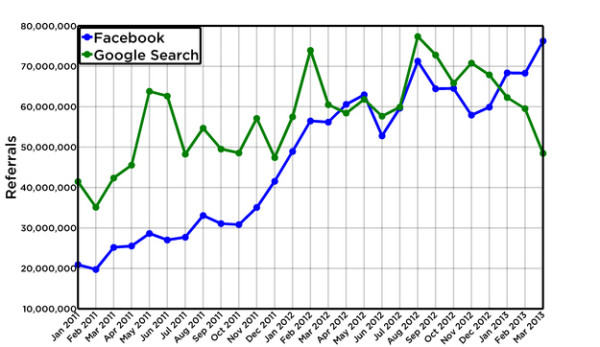How “Not Provided” May Make BuzzFeed Think Google’s Search Traffic To News Sites Is Down
Well look at that! Search traffic to news sites has dropped over the past eight months, according to how BuzzFeed tracks referrals to sites within its network. A change of user behavior? Or perhaps more the result of “Dark Google” and “Not Provided?” Come on, I’ll explain how Google may be making itself look like […]
 Well look at that! Search traffic to news sites has dropped over the past eight months, according to how BuzzFeed tracks referrals to sites within its network. A change of user behavior? Or perhaps more the result of “Dark Google” and “Not Provided?” Come on, I’ll explain how Google may be making itself look like it’s in decline.
Well look at that! Search traffic to news sites has dropped over the past eight months, according to how BuzzFeed tracks referrals to sites within its network. A change of user behavior? Or perhaps more the result of “Dark Google” and “Not Provided?” Come on, I’ll explain how Google may be making itself look like it’s in decline.
Where Has All The Google Traffic Gone?
BuzzFeed said that it looked at traffic to 200 publishers in its network and found a marked decline in Google traffic from September 2012 onward. The network includes sites like Rolling Stone and The Huffington Post. My mind is blown that the Huffington Post is somehow in the BuzzFeed Network, by the way. Do they aggregate each other?
Here’s the key chart:
Look at that: Facebook ascendant, Google in decline! That seemingly matches up with what some news publishers have said in the past few years, that social is a bigger driver of traffic to them than search. But they rarely qualify that even in these cases, it’s usually not that search went into decline. It’s that while search keeps growing, social has turned into an entirely new audience stream they didn’t have before, one that’s also rocketing up. The pie got bigger, so that both the search and social slices grew.
But that chart suggests the opposite, that Google is plunging, Why. Why? Why!
BuzzFeed tries to puzzle it out. Is social growing? Is SEO no longer king? Is SEO just harder? Is “Dark Social” masking even more social gains?
Blame Google For Google’s Seeming Decline
Try Dark Google perhaps being to blame. That’s how Google, back in October 2011, started withholding from publishers the search terms people used to find them on Google. Withheld, that is, unless you’re an advertiser.
Google has some strong arguments that this is all about privacy, but there are plenty of loopholes that are still left open. Meanwhile, Google got caught off-guard by something unexpected. Apple.
See, when Google stopped showing search terms, it still at least did things in a way that let publishers know that traffic came from Google Search generally. What it didn’t expect was that Apple might seize upon Google’s “private” search for use when iOS 6 came out last year.
How Mobile Safari Turns Google Traffic Into Direct Traffic
When Apple did that — in September of last year — Google didn’t appear to be ready for it. Rather than ensure that traffic from mobile Safari still at least passed along the fact that someone had done a search at Google, even if you couldn’t know the exact search, Google let the click show no referral at all.
In other words, before September, if someone searched on mobile Safari at Google and went to a web site, they’d show up as if they were Google traffic. After that, they showed up as if they were a “direct visit.”
Now look again at that chart. You can see the “decline” starts in September and stays pretty consistent each month other than in December. Other things might have helped mask the impact of the Safari loss that month. After all, you can see in previous months that there are times when Google has seen gains and drops.
But from my perspective, if you’ve seen a sudden drop in Google traffic over the course of several months — and it’s not due to a Google penalty — perhaps it’s the Safari issue just getting worse. It’s a problem that Google has strangely allowed to fester for months now, one that seemingly is in Google’s ability to fix.
If you really want to know, you’d look at direct traffic. Is that rising? Or look at mobile Safari traffic. Is that coming up higher in relation to the traffic that’s dropping from Google?
Of course, mobile Safari traffic might not be big enough to a particular site to explain all this drop. Many other factors might come into play, including that sites in the network are indeed receiving less traffic or perhaps other things that might be causing some of that Google traffic to be “dark.”
NOTE: I’ve updated this story and headline slightly from the original to better qualify that the mobile Safari issue might be to blame, not that it is definitely to blame. I think it is a contributing factor, but I can’t tell from afar, and it might be other things also at work.
Contributing authors are invited to create content for Search Engine Land and are chosen for their expertise and contribution to the search community. Our contributors work under the oversight of the editorial staff and contributions are checked for quality and relevance to our readers. The opinions they express are their own.
Related stories
New on Search Engine Land
